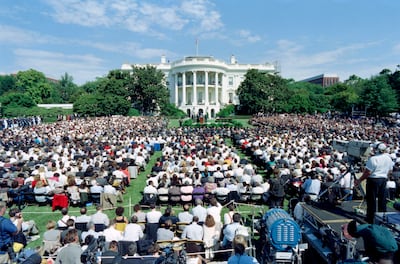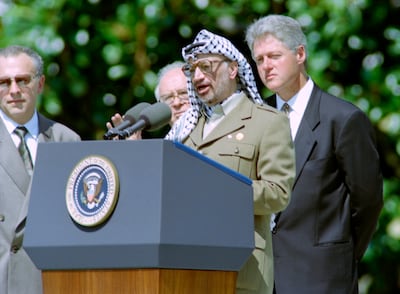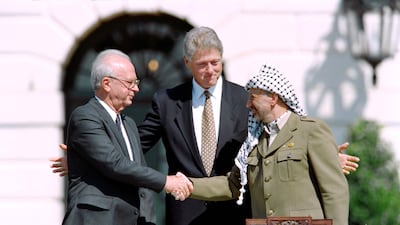As they cast their minds back exactly three decades, Ghassan Khatib, Yossi Beilin and Clyde Haberman all remember the surge of optimism the day the Oslo Accords were signed.
The three men had different roles and responsibilities in what was then the Middle East peace process. But all had vantage points that made them very well positioned to judge.
Peace between Palestine and Israel had come tantalisingly into view.
It was 1993 and Palestine Liberation Organisation chairman Yasser Arafat and Israeli prime minister Yitzhak Rabin shook hands in the garden of the White House with US president Bill Clinton beaming on.
It was the truest gesture of compromise between Palestinian and Israeli leaders since the establishment of Israel in 1948.
Diplomacy was ascendant. The Cold War had just ended.
The Palestinian cause had been driven internationally at the outbreak of the First Intifada in 1987 and a victorious US seized its newfound influence at the end of the First Gulf War in 1991 to make peace between Palestinians and Israelis.
Mr Haberman was one of the first journalists to break the news of the Oslo Accords.
Mr Beilin was a crucial architect of the agreement on the Israeli side and a former minister, and Mr Khatib was a member of the Palestinian negotiating team and a veteran of the earlier 1991 Madrid Conference.
Despite their different roles, they were all optimistic that peace was the closest it had ever been.
Now, 30 years after the Oslo Accords, they are alike in their despair.
Israel has the most right-wing government in its history, with ministers who advocate annexation of Palestinian territory.
Many young Palestinians, who have never known a working peace process, choose militancy over dialogue.
“It is far from being a celebration,” Mr Beilin says of Wednesday’s anniversary.
“The Oslo agreement was meant to be a corridor towards a target that has never been achieved. In that sense, the anniversary is a tragedy.”

Mr Khatib agrees: “I think the feeling on the anniversary is one of disappointment.
“Thirty years back, most people were optimistic. In a Palestinian opinion poll I was involved in at the time, we found that three weeks after signing the Oslo Accords, two thirds of Palestinians were optimistic and supportive of the agreement.
“But things steadily changed, and now we’ve reached a point when the situation is even worse than it was before Oslo."
Mr Haberman is no longer in the region that gave him his remarkable story. He left Jerusalem for good after a short return journey of a few months in 2001. But the anniversary still weighs heavily.
“I never doubted for a second that the negotiations would be difficult, but I thought that each side had finally made the cosmic breakthrough of recognising the other’s existence and that neither was going away,” he says.
The source for his story was remarkable.
“As far as I recall, I first got wind that something was happening in Oslo from a money exchanger in East Jerusalem called Nabil Feidi," Mr Haberman says.
"A lot of journalists patronised his shop because of his good rates. He always knew a lot and had his ear to the ground.

“I’d been on leave and just got back to Jerusalem. I went to visit him and he said that something had been going on.
"It all sounded really intriguing, so I started to poke around. Sure enough, some details began to emerge about the agreement.
“We didn’t have many details – those would come out later – but there was a great sense of hopefulness about it all. That was soon smashed.”
Mr Haberman left Jerusalem in 1995. When he returned, the change in atmosphere was stark
“By the time I went back to Jerusalem in 2001, during the Second Intifada, hope had disappeared," he says.
"It was clear everything had broken down into an endless cycle of terror attacks and Israeli crackdowns on Palestinian areas. I haven’t seen any movement in recent years. I think that the whole process is dead.”
All three blame extremism for the decline and extinction of the Oslo Accords.
Mr Khatib’s assessment is blunt: “Who should we blame? I always place the blame for this change within Israel.
"The Israel we negotiated with 30 years ago is not the Israel that you see now.”

When asked how things will look at the 40th anniversary, Mr Khatib predicts an even bleaker outlook.
“It will be worse, because Israel is the driving force in this formula," he says. "It is the most powerful side.
"Something very significant is happening in Israeli society. Changing demographics and political thinking make peace less likely. In the immediate future, there is no hope."
For Mr Beilin, the most extreme ends of politics on both sides are to blame.
“Oslo finally marked a recognition between the two national movements after so many years," he says. "The extremists on both sides succeeded in thwarting it.”
But so did flawed tactics. “Rather than use Oslo to have a permanent agreement, we used it to have an interim one," Mr Beilin says.
"This, I believe, was our biggest mistake. The interim agreement became a permanent agreement, and a lousy one at that.”
Opinions start to differ on how to find peace from here. Mr Beilin believes a new framework is the way.
“My own idea is to establish a confederation of the two states, which are totally sovereign and independent, but that have a close relationship," he says.
"The Israeli settlers who live in the West Bank would be allowed to remain Israeli citizens and become Palestinian residents, and the same number of Palestinian citizens who would like to live in Israel would be allowed to do that.”
That could happen with a new Israeli government, he believes, pointing to opinion polls that say today’s opposition would enjoy a landslide at the next election.
Changing geopolitics in the Middle East could also spur progress. Speaking of any normalisation with Saudi Arabia, Mr Beilin notes an important change in attitude in today’s Palestinian Authority, as reports mount that the Arab kingdom is considering proper relations with Israel.
“Decades ago, the Palestinian Authority would have the wrong response to suggestions that certain Arab states would normalise relations with Israel," he says. "They did not put constructive negotiating points forward.
“Today we see the Palestinians at least acknowledging that Saudi Arabia might normalise ties. In turn, the Palestinians are taking the initiative to tell Saudi Arabia what concessions to ask of Israel on their behalf.
“Saudi Arabia could insist on things that are conducive to a renewal of peace talks. It won’t be easy – with today’s government in Israel, God forbid.
"But there could be progress with next government, which may come tomorrow or three years from now.”
Fundamentally, Mr Beilin believes finding peace is grounded in interests that have never changed.
“Peace would give Palestinians self-determination and Israel the chance to have a Jewish majority in a democratic state," he says.
"These interests will not die. The only question is how can we fulfil them in a new reality.”
Mr Khatib thinks that Israel’s dysfunctional and increasingly radical politics could inadvertently encourage peace.

“I felt at the time of Oslo genuine willingness to compromise among the majority of Palestinians and Israelis," he says.
"I remember that feeling suddenly changing when Jewish terrorists assassinated Prime Minister Rabin.
“Since then we witnessed a gradual change in Israeli public opinion. Successive governments have been more and more right-wing and unwilling to compromise, barring some fluctuations.
“I do think, however, that Israel is committing mistakes that will reflect negatively on it in the long term, which might bring new dynamics that we cannot identify now.
"They could encourage it to return to negotiations.”
Mr Haberman can only hope for a miracle: “I wish I could be optimistic but I see absolutely no reason.
"And yet, the miracle of Oslo was that everything seemed impossible just before it happened.”


